Education and morality 教育与道德-英语作文
有关道德和美德的英语作文必修三
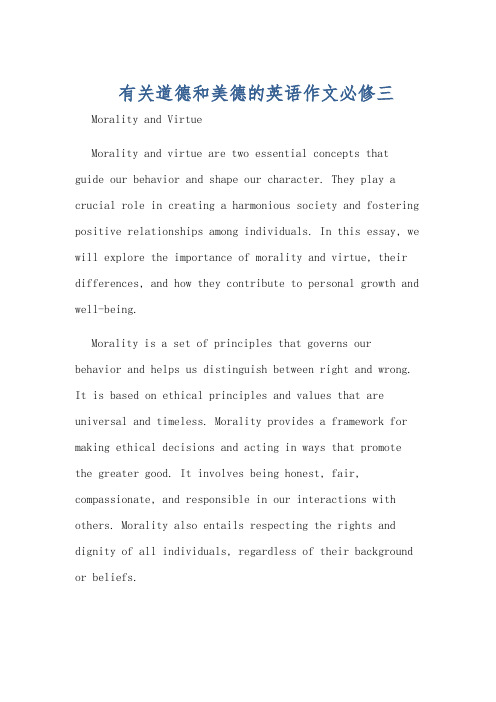
有关道德和美德的英语作文必修三Morality and VirtueMorality and virtue are two essential concepts that guide our behavior and shape our character. They play a crucial role in creating a harmonious society and fostering positive relationships among individuals. In this essay, we will explore the importance of morality and virtue, their differences, and how they contribute to personal growth and well-being.Morality is a set of principles that governs our behavior and helps us distinguish between right and wrong. It is based on ethical principles and values that are universal and timeless. Morality provides a framework for making ethical decisions and acting in ways that promote the greater good. It involves being honest, fair, compassionate, and responsible in our interactions with others. Morality also entails respecting the rights and dignity of all individuals, regardless of their background or beliefs.Virtue, on the other hand, refers to the qualities or traits that are considered morally good and desirable. Virtues such as honesty, integrity, courage, and kindness are seen as essential for leading a fulfilling and meaningful life. Cultivating virtues helps us develop a strong moral character and enables us to overcome challenges and adversities with grace and dignity. Virtues also contribute to building trust and credibility in our relationships with others, as they demonstrate our commitment to ethical behavior and integrity.While morality and virtue are closely related, they are not synonymous. Morality provides the foundation forethical behavior, while virtue represents the qualities and traits that embody moral excellence. In other words, morality dictates what is right and wrong, while virtue guides us in embodying those principles in our actions and decisions.Both morality and virtue are essential for personal growth and well-being. By adhering to moral principles and cultivating virtues, we develop a strong sense of self-awareness, integrity, and resilience. We become morecompassionate, empathetic, and understanding towards others, leading to deeper and more meaningful relationships. Additionally, practicing morality and virtue can enhanceour sense of purpose and fulfillment, as we align ouractions with our values and beliefs.In conclusion, morality and virtue are fundamental concepts that shape our character and guide our behavior.By upholding moral principles and cultivating virtues, we can contribute to a more ethical and compassionate society, while also experiencing personal growth and fulfillment. It is essential to prioritize morality and virtue in our lives, as they provide the foundation for leading a meaningful and purposeful existence.道德与美德道德和美德是指导我们行为和塑造我们性格的两个重要概念。
道德与美德英文作文
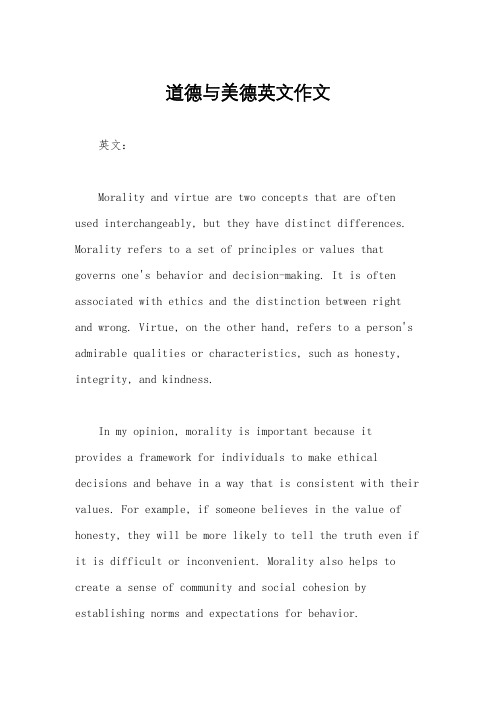
道德与美德英文作文英文:Morality and virtue are two concepts that are often used interchangeably, but they have distinct differences. Morality refers to a set of principles or values that governs one's behavior and decision-making. It is often associated with ethics and the distinction between right and wrong. Virtue, on the other hand, refers to a person's admirable qualities or characteristics, such as honesty, integrity, and kindness.In my opinion, morality is important because it provides a framework for individuals to make ethical decisions and behave in a way that is consistent with their values. For example, if someone believes in the value of honesty, they will be more likely to tell the truth even if it is difficult or inconvenient. Morality also helps to create a sense of community and social cohesion by establishing norms and expectations for behavior.Virtue, on the other hand, is important because it reflects a person's character and can influence how others perceive them. For example, someone who is known for their kindness and compassion is more likely to be respected and admired by others. Virtue also contributes to personal fulfillment and happiness by allowing individuals to livein accordance with their values and beliefs.In my personal experience, I have found that both morality and virtue are important in my daily life. For example, I try to live by the principle of honesty and integrity in my interactions with others, and I also strive to cultivate virtues such as empathy and compassion. These values and qualities have helped me to build strong relationships with others and to feel fulfilled in my personal and professional life.中文:道德和美德是两个常常被混淆的概念,但它们有着明显的区别。
以德为先立德树人英语作文
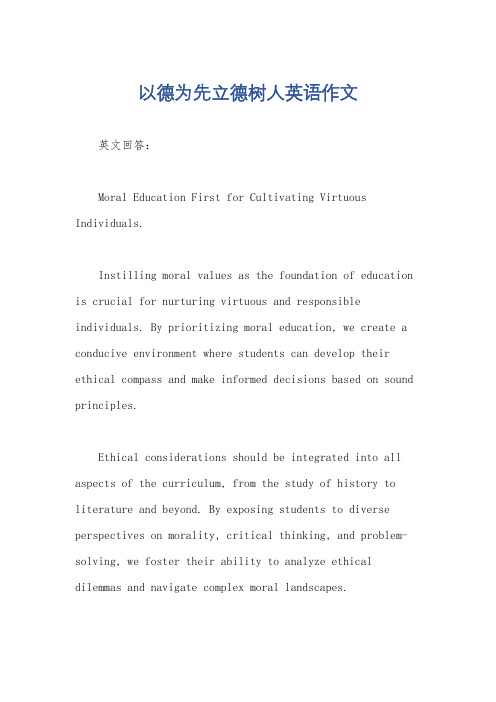
以德为先立德树人英语作文英文回答:Moral Education First for Cultivating Virtuous Individuals.Instilling moral values as the foundation of education is crucial for nurturing virtuous and responsible individuals. By prioritizing moral education, we create a conducive environment where students can develop their ethical compass and make informed decisions based on sound principles.Ethical considerations should be integrated into all aspects of the curriculum, from the study of history to literature and beyond. By exposing students to diverse perspectives on morality, critical thinking, and problem-solving, we foster their ability to analyze ethical dilemmas and navigate complex moral landscapes.Equally important is the role of educators in exemplifying moral values in their interactions with students. Teachers and administrators should embody the principles they teach, serving as role models of integrity, compassion, and respect. By creating a culture of respect and empathy, schools can promote a positive and supportive learning environment where students feel valued and encouraged to grow morally.Moreover, schools should establish clear moral guidelines and expectations to provide students with a framework for ethical behavior. These guidelines should be communicated effectively and enforced consistently, ensuring that students understand the consequences of their actions and are held accountable for their moral choices.Furthermore, involving families and the community in moral education is essential to reinforce the values taught in school. Parents and guardians play a vital role in shaping their children's moral development, and by collaborating with educators, they can create a cohesive and supportive environment for fostering ethical behavior.By prioritizing moral education first, we empower students with the knowledge, skills, and values necessaryto make responsible decisions, contribute positively totheir communities, and lead virtuous lives. It is through the cultivation of ethical individuals that we build a just and harmonious society.中文回答:以德为先立德树人。
道德教育的意义英语作文

道德教育的意义英语作文The Significance of Moral Education。
Introduction:Moral education plays a crucial role in shaping the character and values of individuals. It is an essential aspect of education that goes beyond academic knowledge and equips students with the necessary skills to navigate through life. This essay aims to explore the significance of moral education and its impact on individuals and society.Body:1. Fostering ethical behavior:Moral education instills ethical values in individuals, promoting honesty, integrity, and empathy. It teaches students to differentiate between right and wrong, enablingthem to make ethical decisions and take responsibility for their actions. By cultivating a sense of morality, individuals become more conscientious and contribute positively to society.2. Developing social skills:Moral education emphasizes the importance of respect, cooperation, and tolerance, which are crucial for building healthy relationships and fostering a harmonious society. Students learn to appreciate diversity and accept others' perspectives, leading to better communication and cooperation in various social settings.3. Cultivating empathy and compassion:Through moral education, individuals develop empathy and compassion towards others, fostering a sense of kindness and understanding. This enables them to connect with people from different backgrounds and cultures, promoting inclusivity and reducing discrimination and prejudice.4. Nurturing responsible citizenship:Moral education plays a vital role in nurturing responsible citizens who actively contribute to their communities. It teaches individuals the importance of civic duties, such as voting, volunteering, and respecting the law. By instilling a sense of social responsibility, moral education empowers individuals to actively participate in creating a better society.5. Enhancing decision-making skills:Moral education equips individuals with critical thinking and decision-making skills. By presenting ethical dilemmas and discussing their implications, students learn to analyze situations from multiple perspectives and make informed choices. This helps them navigate complex moral issues and make ethical decisions in their personal and professional lives.6. Promoting personal well-being:Moral education focuses on the holistic development of individuals, including their emotional and mental well-being. It promotes self-reflection, self-discipline, and self-awareness, enabling individuals to develop a strong sense of identity and purpose. By nurturing their mental and emotional health, moral education contributes tooverall well-being.Conclusion:Moral education is of paramount importance as it shapes individuals' character, values, and behavior. By fostering ethical behavior, developing social skills, cultivating empathy and compassion, nurturing responsible citizenship, enhancing decision-making skills, and promoting personal well-being, moral education plays a significant role in creating a better society. It is essential for educational institutions to prioritize moral education alongside academic knowledge to ensure the holistic development of individuals.。
英语作文关于道德
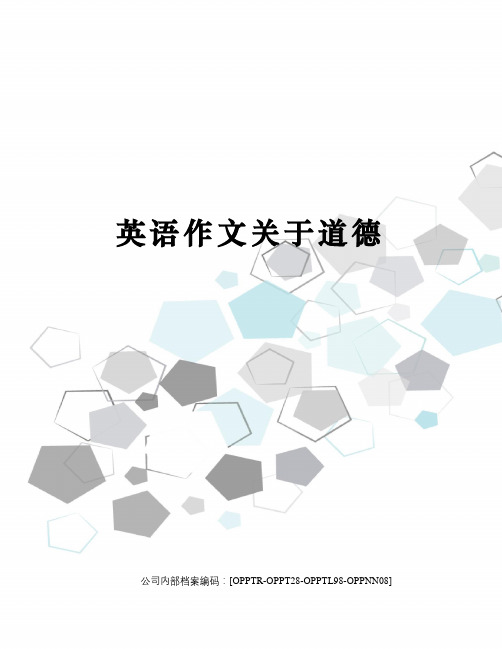
英语作文关于道德公司内部档案编码:[OPPTR-OPPT28-OPPTL98-OPPNN08]原文:道德与教育每个人都认识到国力的强大依靠教育。
教育水平越高,国家就越强盛,这是千真万确的。
但我的观点是,为了国家的强盛,单独的教育是不够的,教育与道德应双管齐下,不能偏颇。
道德与教育是国家的基石,缺少任何一个,成功都是不可能的。
没有道德的教育是危险的,而没有教育的道德是有害的。
译文:Morality and EducationIt is recognized by everybody that the strength of a country depends upon its education. The higher the education standards, the stronger the country becomes. That is true indeed.But my opinion is that, in order to make a country strong, education alone is not sufficient. It should go side by side with morality.. Morality and education are the foundation of a country. The absence of either makes success impossible. Education without morality is dangerous. Morality without education is also harmful.(汉语)我曾经读过意大利诗人但丁说的一句话:“一个知识不全的人可以用道德去弥补,而一个道德不全的人却难以用知识去弥补。
”这句话让我明白了知识与道德的关系,也感觉到道德的重要性。
其实,“道德”就是在别人有困难的时候,伸出你的援助之手。
道德 英语作文

In today's increasingly diverse and interconnected world, the cultivation of morality becomes more complex, as individuals from different cultural backgrounds may hold varying beliefs and values. In such a context, it is essential to promote universal moral principles that transcend cultural and religious boundaries, such as respect for human dignity, fairness, and empathy. By recognizing the common humanity that binds all people, individuals can embrace diversity while upholding shared moral standards that foster understanding and harmony.
1. The significance of morality
Morality serves as the foundation for ethical decision-making and responsible conduct. It encompasses a set of principles that govern how individuals should behave towards others and what is considered right or wrong. Without a moral compass, society would descend into chaos, as there would be no guiding principles to regulate behavior and resolve conflicts. Therefore, the cultivation of moral values is essential for building a harmonious and prosperous community.
有关道德和美德的英语作文必修三
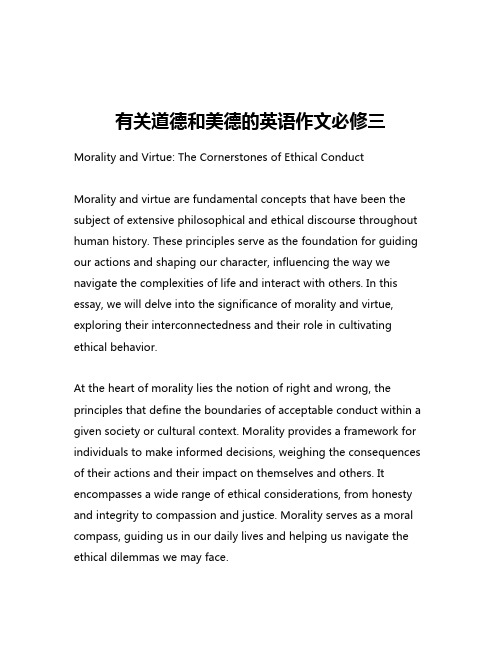
有关道德和美德的英语作文必修三Morality and Virtue: The Cornerstones of Ethical ConductMorality and virtue are fundamental concepts that have been the subject of extensive philosophical and ethical discourse throughout human history. These principles serve as the foundation for guiding our actions and shaping our character, influencing the way we navigate the complexities of life and interact with others. In this essay, we will delve into the significance of morality and virtue, exploring their interconnectedness and their role in cultivating ethical behavior.At the heart of morality lies the notion of right and wrong, the principles that define the boundaries of acceptable conduct within a given society or cultural context. Morality provides a framework for individuals to make informed decisions, weighing the consequences of their actions and their impact on themselves and others. It encompasses a wide range of ethical considerations, from honesty and integrity to compassion and justice. Morality serves as a moral compass, guiding us in our daily lives and helping us navigate the ethical dilemmas we may face.Virtue, on the other hand, refers to the positive character traits and moral excellence that individuals strive to cultivate within themselves. Virtues such as courage, temperance, wisdom, and justice have been revered throughout history as hallmarks of moral character. These virtues are not merely abstract concepts but rather tangible qualities that shape our behavior and interactions with others. When we embody and exemplify these virtues, we demonstrate a commitment to ethical conduct and a desire to contribute positively to our communities.The relationship between morality and virtue is symbiotic and interdependent. Morality provides the ethical principles that guide our actions, while virtue represents the personal qualities and habits that enable us to uphold those principles. Individuals who possess a strong sense of morality are more likely to develop and exhibit virtuous traits, as they strive to align their actions with their ethical beliefs. Conversely, the cultivation of virtue can deepen our understanding and internalization of moral principles, leading to more consistent and principled behavior.One of the primary functions of morality and virtue is to foster social cohesion and collective well-being. When individuals within a society adhere to shared moral standards and cultivate virtuous traits, they are more likely to engage in cooperative and mutually beneficial interactions. This, in turn, contributes to the creation of a harmoniousand stable social fabric, where trust, respect, and reciprocity become the foundation for interpersonal relationships.Moreover, the importance of morality and virtue extends beyond the individual level, as they play a crucial role in shaping the ethical foundations of institutions, organizations, and systems. Leaders and decision-makers who embrace moral and virtuous principles are more likely to make choices that prioritize the common good over narrow self-interest. This, in turn, can lead to the development of policies, laws, and structures that promote the well-being of all members of society, rather than catering to the privileged few.However, the cultivation of morality and virtue is not without its challenges. In today's complex and rapidly changing world, individuals are often confronted with ethical dilemmas that test the limits of their moral compass. The temptation to prioritize personal gain over the greater good, the influence of societal pressures and biases, and the ambiguity of certain ethical situations can all pose obstacles to the consistent application of moral and virtuous principles.To overcome these challenges, it is essential to cultivate a deep understanding and internalization of moral and virtuous principles. This can be achieved through education, self-reflection, and the development of practical wisdom. By engaging in ongoing dialogueand critical analysis of ethical issues, individuals can strengthen their ability to make informed and principled decisions, even in the face of difficult circumstances.Additionally, the cultivation of morality and virtue requires a commitment to lifelong learning and personal growth. As our understanding of ethical concepts evolves and the complexities of the world change, we must be willing to adapt and refine our moral and virtuous practices. This may involve challenging our own biases, seeking out diverse perspectives, and continuously striving to align our actions with our ethical beliefs.In conclusion, morality and virtue are essential components of ethical conduct, serving as the cornerstones that guide our individual and collective actions. By embracing these principles and cultivating virtuous traits, we can contribute to the creation of a more just, compassionate, and harmonious society. As we navigate the ethical challenges of our time, let us remain steadfast in our commitment to morality and virtue, using them as a beacon to light our way forward.。
伦理道德英语作文范文
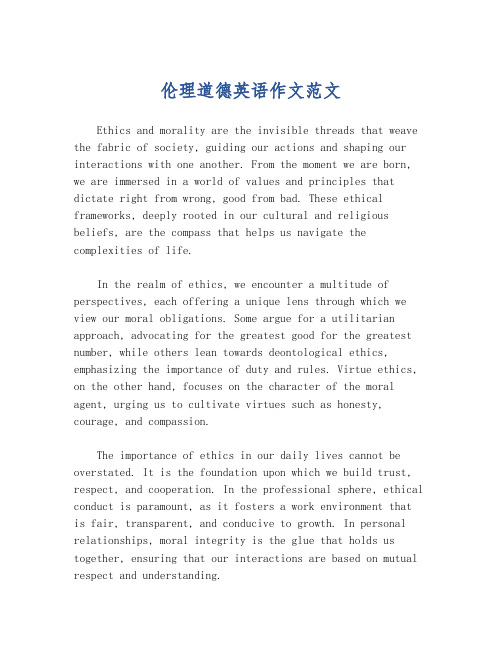
伦理道德英语作文范文Ethics and morality are the invisible threads that weave the fabric of society, guiding our actions and shaping our interactions with one another. From the moment we are born, we are immersed in a world of values and principles that dictate right from wrong, good from bad. These ethical frameworks, deeply rooted in our cultural and religious beliefs, are the compass that helps us navigate the complexities of life.In the realm of ethics, we encounter a multitude of perspectives, each offering a unique lens through which we view our moral obligations. Some argue for a utilitarian approach, advocating for the greatest good for the greatest number, while others lean towards deontological ethics, emphasizing the importance of duty and rules. Virtue ethics, on the other hand, focuses on the character of the moral agent, urging us to cultivate virtues such as honesty, courage, and compassion.The importance of ethics in our daily lives cannot be overstated. It is the foundation upon which we build trust, respect, and cooperation. In the professional sphere, ethical conduct is paramount, as it fosters a work environment that is fair, transparent, and conducive to growth. In personal relationships, moral integrity is the glue that holds us together, ensuring that our interactions are based on mutual respect and understanding.However, the complexities of the modern world often present us with ethical dilemmas that challenge our preconceived notions of right and wrong. Issues such as privacy, data security, and environmental sustainability require us to constantly reevaluate our moral stances and adapt our ethical frameworks to new challenges.Education plays a crucial role in shaping our ethical understanding. By teaching the principles of ethics and encouraging critical thinking, we can equip the next generation with the tools to make informed moral decisions. It is through education that we can instill a sense of responsibility and a commitment to upholding the values that define our society.In conclusion, ethics and morality are not static concepts but dynamic forces that evolve with time and experience. As we continue to grapple with the moral challenges of our era, it is imperative that we engage in open dialogue, foster a culture of ethical awareness, and strive to make the world a better place for all.。
道德与美德英语作文高中

道德与美德英语作文高中Morality and VirtueMorality and virtue are two important concepts that have been discussed and debated for centuries. Both play significant roles in shaping the behavior and character of individuals, as well as the overall well-being of society. In this essay, we will explore the meanings of morality and virtue, their importance, and how they can be cultivated and practiced in our daily lives.Morality can be defined as the principles concerning the distinction between right and wrong or good and bad behavior. It is a set of rules and values that guide individuals in making ethical decisions and treating others with respect and fairness. Morality is often influenced by cultural, religious, and societal norms, and it helps to maintain social order and harmony.On the other hand, virtue refers to the qualities of excellence and moral goodness that individuals strive to embody. Virtues such as honesty, kindness, courage, and compassion are considered to be essential for leading ameaningful and fulfilling life. Virtue ethics, a branch of ethical philosophy, emphasizes the importance ofcultivating virtuous character traits and living in accordance with them.Now let's discuss the importance of morality and virtue in our lives. Both morality and virtue are crucial for fostering positive relationships, promoting a sense of justice and equality, and creating a harmonious community. When individuals adhere to moral principles and practice virtues, they contribute to the well-being of society and inspire others to do the same. Furthermore, moral and virtuous behavior leads to personal growth and inner peace, as it enables individuals to live in alignment with their values and beliefs.In order to cultivate and practice morality and virtue, it is essential to develop a strong sense of self-awareness and self-discipline. This involves reflecting on one's actions and their impact on others, as well as making conscious efforts to cultivate virtuous qualities. Additionally, individuals can seek guidance from moral and ethical teachings, role models, and religious orphilosophical traditions that promote moral and virtuous living.In conclusion, morality and virtue are integral aspectsof human existence that guide individuals in making ethical decisions, fostering positive relationships, andcontributing to the well-being of society. By cultivating and practicing morality and virtue, individuals can lead meaningful and fulfilling lives while positivelyinfluencing those around them.道德与美德道德与美德是两个重要的概念,几个世纪以来一直在讨论和辩论。
德育与美育英语作文
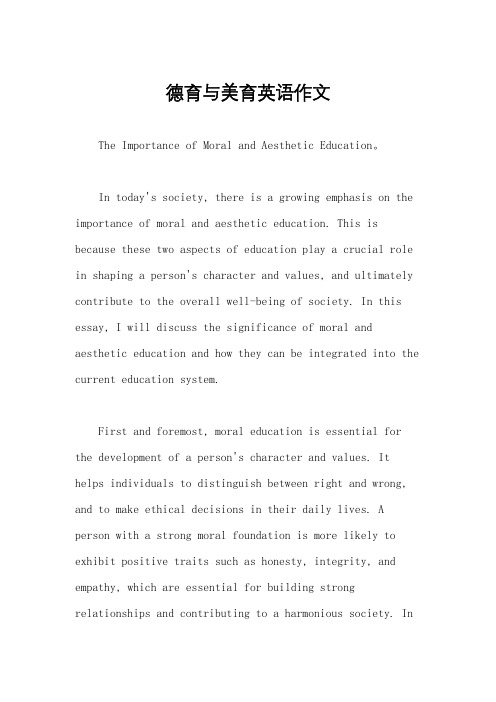
德育与美育英语作文The Importance of Moral and Aesthetic Education。
In today's society, there is a growing emphasis on the importance of moral and aesthetic education. This is because these two aspects of education play a crucial role in shaping a person's character and values, and ultimately contribute to the overall well-being of society. In this essay, I will discuss the significance of moral and aesthetic education and how they can be integrated into the current education system.First and foremost, moral education is essential for the development of a person's character and values. It helps individuals to distinguish between right and wrong, and to make ethical decisions in their daily lives. A person with a strong moral foundation is more likely to exhibit positive traits such as honesty, integrity, and empathy, which are essential for building strong relationships and contributing to a harmonious society. Inaddition, moral education also helps to instill a sense of responsibility and accountability, which are important for personal and social development.Aesthetic education, on the other hand, is importantfor nurturing a person's appreciation for beauty and creativity. It helps individuals to develop an aesthetic sensibility and to recognize and appreciate the value of art, music, literature, and other forms of creative expression. Aesthetic education also encourages individuals to think critically and express themselves creatively, which are important skills for personal and professional success. Furthermore, exposure to the arts and culture can also have a positive impact on a person's emotional and psychological well-being, contributing to a more balanced and fulfilling life.In order to effectively integrate moral and aesthetic education into the current education system, it is important to consider several key factors. Firstly, it is essential to develop a comprehensive curriculum that includes both moral and aesthetic education, and to provideteachers with the necessary training and resources to effectively deliver this curriculum. This may involve incorporating moral and aesthetic education into existing subjects such as history, literature, and the arts, as well as developing new courses and programs specifically focused on these areas.In addition, it is important to create a supportive and nurturing learning environment that encourages students to explore their moral and aesthetic sensibilities, and to express themselves creatively. This may involve providing access to a wide range of cultural and artistic experiences, such as museum visits, theater productions, and music performances, as well as opportunities for students to engage in creative activities such as writing, painting,and music composition.Furthermore, it is important to involve parents and the wider community in the process of moral and aesthetic education, as they play a crucial role in shaping aperson's values and appreciation for the arts. This may involve organizing community events and workshops, as wellas providing resources and support for parents to engage in moral and aesthetic education with their children at home.In conclusion, moral and aesthetic education are essential for the holistic development of individuals and the overall well-being of society. By integrating these two aspects of education into the current education system, we can help to nurture a generation of individuals who are not only academically proficient, but also morally upright and aesthetically sensitive. This will ultimately contribute to a more harmonious and prosperous society for future generations.。
倡导德智体美劳五育教育的英语作文

倡导德智体美劳五育教育的英语作文Advocating comprehensive education in morality, intelligence, physicality, aesthetics, and labor is crucial in shaping well-rounded individuals. This type of education, known as the "five development goals" in Chinese education, emphasizes the holistic development of students and aims to cultivate their diverse potentials.Morality education plays a fundamental role in fostering good character traits and ethical values in students. It teaches them the importance of honesty, integrity, respect, and compassion. By instilling moral principles in students, we can guide them to make responsible decisions and develop positive relationships with others. This in turn contributes to creating a harmonious and caring society.Intelligence education focuses on developing students' cognitive abilities, critical thinking skills, and problem-solving capabilities. It encourages students to actively engage in the learning process, think independently, and acquire knowledge through inquiry and exploration. By nurturing their intellectual curiosity and creativity, we can empower students to adapt to a rapidly changing world and become lifelong learners.Physical education is essential for promoting students' physical health, fitness, and well-being. It encourages them to adopt healthy lifestyles, participate in regular exercise, and develop strong bodies. Physical activities not only improve students' physical health but also enhance their mental and emotional well-being. By engaging in sports and physical exercises, students can build confidence, teamwork skills, and resilience.Aesthetic education focuses on cultivating students' appreciation for art, music, literature, and other forms of beauty. It encourages them to develop their artistic talents, creativity, and imagination. By exposing students to different forms of aesthetic expression, we can broaden their horizons, stimulate their senses, and deepen their emotional experiences. Aesthetic education fosters students' aesthetic sensibility and helps them develop an appreciation for the beauty of the world around them.Labor education emphasizes the value of hard work, perseverance, and practical skills. It teaches students the importance of being industrious, self-reliant, and resourceful. By engaging in hands-on activities and vocational training, students can develop practical skills, work ethic, and entrepreneurial spirit.Labor education prepares students for the challenges of the workforce and equips them with the skills needed to succeed in their chosen careers.In conclusion, advocating comprehensive education in morality, intelligence, physicality, aesthetics, and labor is essential for nurturing well-rounded individuals. By embracing the principles of the five development goals, we can create a more inclusive, balanced, and harmonious educational environment that empowers students to realize their full potential and contribute positively to society. Let us continue to support and promote the holistic development of students through the five-pillar approach to education.。
五育并举的英语作文

五育并举的英语作文英文回答:In the tapestry of education, five strands intertwine harmoniously to cultivate well-rounded individuals. These five strands, known as the Five Great Disciplines (五育并举), are: morality (德育), intellectual development (智育), physical health (体育), aesthetics (美育), and labor education (劳动教育).Morality: This strand lays the foundation for character and ethical behavior. It instills values of respect, compassion, integrity, and responsibility. Students learn to navigate moral dilemmas and make informed decisions that align with their values.Intellectual Development: This strand emphasizescritical thinking, problem-solving, and the pursuit of knowledge. It provides a rigorous academic foundation in core subjects such as mathematics, science, language, andhistory. Students develop their analytical skills, curiosity, and lifelong love of learning.Physical Health: This strand promotes physical well-being, fitness, and an active lifestyle. It includes activities such as physical education, sports, and outdoor recreation. Students develop their coordination, strength, endurance, and healthy habits that will benefit them throughout their lives.Aesthetics: This strand cultivates appreciation for beauty, creativity, and artistic expression. It encompasses activities such as music, art, drama, and dance. Students develop their imagination, emotional intelligence, and a sense of wonder and appreciation for the world around them.Labor Education: This strand emphasizes the value of work and practical skills. It includes both vocational and practical training in areas such as agriculture, manufacturing, and service. Students learn the importance of hard work, teamwork, and contributing to society.The Five Great Disciplines work togethersynergistically to create a holistic educational experience. They not only provide a well-rounded foundation forstudents but also prepare them for the challenges and opportunities of the 21st century. By fostering a balance between intellect, character, physical well-being, creativity, and practical skills, the Five GreatDisciplines empower students to lead meaningful andfulfilling lives.中文回答:五育并举。
英语作文德育还是智育

英语作文德育还是智育Title: The Balance Between Moral and Intellectual Education。
Education is often viewed through the dichotomy of moral (德育) and intellectual (智育) development. While both are crucial components of a well-rounded education, the emphasis on one over the other has been a subject of debate for years. In this essay, I will explore the importance of both moral and intellectual education and argue that a balance between the two is essential for the holistic development of individuals.To begin with, intellectual education plays a fundamental role in equipping individuals with the knowledge and skills necessary to navigate the complexities of the modern world. Subjects such as mathematics, science, literature, and history not only cultivate criticalthinking and problem-solving abilities but also provide individuals with the tools to excel in various professionalfields. Furthermore, intellectual education fosters innovation and creativity, driving progress and advancement in society. Without a solid foundation in intellectual education, individuals may struggle to adapt to the rapidly changing demands of the globalized economy.On the other hand, moral education is equally vital in shaping individuals into responsible and ethical members of society. It instills values such as honesty, integrity, empathy, and respect for others, which are essential for fostering harmonious relationships and building strong communities. Moral education goes beyond simply teaching right from wrong; it encourages individuals to reflect on their actions and consider the impact they have on others and the world around them. In a world fraught with ethical dilemmas and moral complexities, the importance of moral education cannot be overstated.While both moral and intellectual education are indispensable, an excessive focus on either one can lead to imbalances and deficiencies in individuals' development. For instance, a system that prioritizes intellectualeducation at the expense of moral education may produce individuals who are academically proficient but lack empathy and moral compass. Conversely, a system that emphasizes moral education while neglecting intellectual development may produce individuals who are morally upright but ill-equipped to navigate the challenges of the modern world.Therefore, it is imperative to strike a balance between moral and intellectual education. A holistic approach to education acknowledges the interconnectedness of these two dimensions and seeks to integrate them seamlessly into the curriculum. Educators play a crucial role in fostering this balance by incorporating moral values and ethical considerations into academic lessons and creating opportunities for students to develop both theirintellectual and moral capacities.Moreover, extracurricular activities, such as community service projects, debate clubs, and ethical dilemmas discussions, can provide valuable opportunities for students to apply their intellectual skills in real-worldcontexts while grappling with moral issues. By engaging in such activities, students not only enhance their academic abilities but also cultivate virtues such as empathy, compassion, and social responsibility.In conclusion, both moral and intellectual education are essential for the holistic development of individuals. Rather than viewing them as competing priorities, we should recognize the complementary nature of these two dimensions and strive to strike a balance between them. By integrating moral values into intellectual pursuits and fostering opportunities for students to develop both theirintellectual and moral capacities, we can ensure that education serves as a catalyst for personal growth and positive societal change.。
五育并举全面发展德智体美劳英语作文
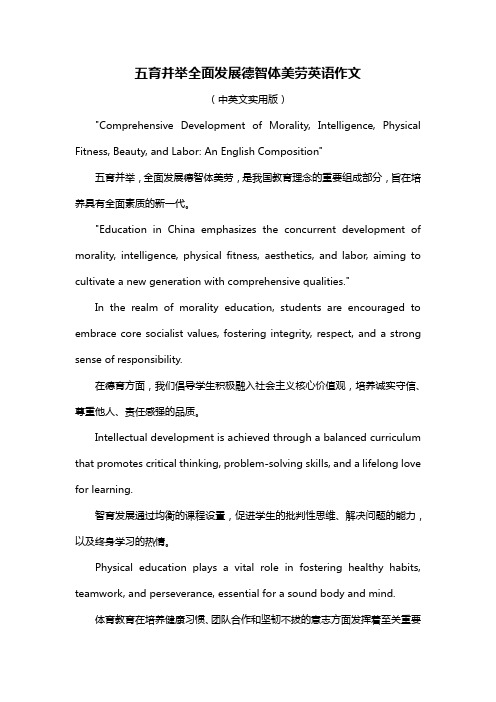
五育并举全面发展德智体美劳英语作文(中英文实用版)"Comprehensive Development of Morality, Intelligence, Physical Fitness, Beauty, and Labor: An English Composition"五育并举,全面发展德智体美劳,是我国教育理念的重要组成部分,旨在培养具有全面素质的新一代。
"Education in China emphasizes the concurrent development of morality, intelligence, physical fitness, aesthetics, and labor, aiming to cultivate a new generation with comprehensive qualities."In the realm of morality education, students are encouraged to embrace core socialist values, fostering integrity, respect, and a strong sense of responsibility.在德育方面,我们倡导学生积极融入社会主义核心价值观,培养诚实守信、尊重他人、责任感强的品质。
Intellectual development is achieved through a balanced curriculum that promotes critical thinking, problem-solving skills, and a lifelong love for learning.智育发展通过均衡的课程设置,促进学生的批判性思维、解决问题的能力,以及终身学习的热情。
Physical education plays a vital role in fostering healthy habits, teamwork, and perseverance, essential for a sound body and mind.体育教育在培养健康习惯、团队合作和坚韧不拔的意志方面发挥着至关重要的作用,这对于健康的身心至关重要。
关于五育并举的英语作文

关于五育并举的英语作文英文回答:In my opinion, the concept of "五育并举" is a comprehensive educational philosophy that emphasizes the balanced development of five aspects of a person: morality, intelligence, physical health, aesthetics, and labor skills. It aims to cultivate well-rounded individuals who possess not only knowledge and skills but also a strong sense of ethics and appreciation for beauty.Firstly, the development of morality is crucial in education. It helps individuals to distinguish right from wrong and to make ethical decisions. For example, schools can organize activities such as community service projectsor character-building workshops to instill values like honesty, integrity, and empathy in students. By doing so, students will not only excel academically but also become responsible and compassionate citizens.Secondly, the development of intelligence is equally important. Education should provide students with a solid foundation of knowledge and critical thinking skills. For instance, teachers can encourage students to engage in discussions and debates, which will enhance theiranalytical and problem-solving abilities. Additionally, schools can offer a wide range of subjects andextracurricular activities to cater to students' diverse interests and talents.Next, physical health should not be neglected in education. Regular physical activities and sports can improve students' physical fitness and promote a healthy lifestyle. For instance, schools can organize sports events, such as inter-school competitions or fitness clubs, to encourage students to participate in physical activities. This not only benefits their physical well-being but also enhances their concentration and overall academic performance.Furthermore, aesthetics play a significant role in education. Art, music, and literature can stimulatecreativity and imagination in students. For example, schools can incorporate art classes, music lessons, or drama clubs into their curriculum to expose students to different forms of artistic expression. This will not only foster their appreciation for beauty but also nurture their artistic talents.Lastly, labor skills are essential for practical application in the real world. Education should equip students with practical skills that can be applied in various fields. For instance, vocational schools can offer specialized training programs in areas such as carpentry, plumbing, or culinary arts. This will enable students to acquire valuable skills and increase their employability in the job market.中文回答:在我看来,“五育并举”的理念是一种综合性的教育理念,强调人的五个方面的平衡发展,道德、智力、身体健康、美学和劳动技能。
以伦理道德写一篇英语作文

Title: The Pillars of Society: The Unwavering Strength of Ethics and MoralityIn the intricate tapestry of human civilization, ethics and morality serve as the indispensable threads that bind us together, weaving a harmonious society where individuals coexist with respect, compassion, and justice. These intangible yet powerful forces guide our actions, shape our character, and define the very essence of what it means to be human.The Foundation of Ethics and MoralityAt its core, ethics pertains to the principles that govern how we ought to behave, often derived from philosophical, religious, or cultural traditions. It is a system of values that helps us distinguish right from wrong, good from evil, in various contexts and situations. Morality, on the other hand, refers to the application of these ethical principles in our daily lives, the practical manifestation of our inner compass. Together, they form the bedrock upon which societies are built, providing a framework for social order, personal growth, and collective prosperity.The Significance of Ethics and Morality in SocietyFirstly, ethics and morality foster trust and cooperation among individuals. In a society where everyone adheres to a shared set of moral principles, people can rely on each other's actions, knowing that they will not be exploited or harmed. This trust is the lifeblood of social and economic transactions, enabling complex systems like markets, governments, and institutions to function efficiently.Secondly, they promote fairness and justice. By ensuring that everyone is treated with dignity and respect, regardless of their background, gender, or beliefs, ethics and morality uphold the basic rights of all members of society. They serve as a safeguard against discrimination, oppression, and injustice, creating an environment where everyone has an equal opportunity to thrive.Furthermore, ethics and morality inspire personal growth and character development. As we strive to live up to our moral ideals, we become more empathetic, responsible, and accountable for our actions. This process of self-reflection and improvement fosters resilience, compassion, and a sense of purpose that enriches not only our own lives but also the lives of those around us.Challenges and the Need for VigilanceHowever, the maintenance of ethical and moral standards is not without challenges. In an increasingly interconnected and complex world, individuals and societies are constantly faced with new dilemmas and temptations that test the limits of our moral compass. The rise of technology, globalization, and rapid social change have introduced new ethical questions, such as data privacy, environmental responsibility, and economic inequality.It is therefore imperative that we remain vigilant, engaging in ongoing discussions and debates to refine our ethical frameworks and adapt them to the ever-evolving realities of our time. Education plays a crucial role in this endeavor, nurturing critical thinking skills and fostering a deep understanding of the importance of ethics and morality in shaping a better world.ConclusionIn conclusion, ethics and morality are the pillars upon which societies stand tall and strong. They provide the moral compass that guides our actions, fosters trust and cooperation, promotes fairness and justice, and inspires personal growth. As we navigate the complexities of the 21st century, let us remain steadfast in our commitment to uphold these timeless values, recognizing that they are not just ideals to aspire to but the very essence of what makes us human. By doing so, we can build a world that is more just, compassionate, and resilient for generations to come.。
Educationandmorality教育与道德-英语作文
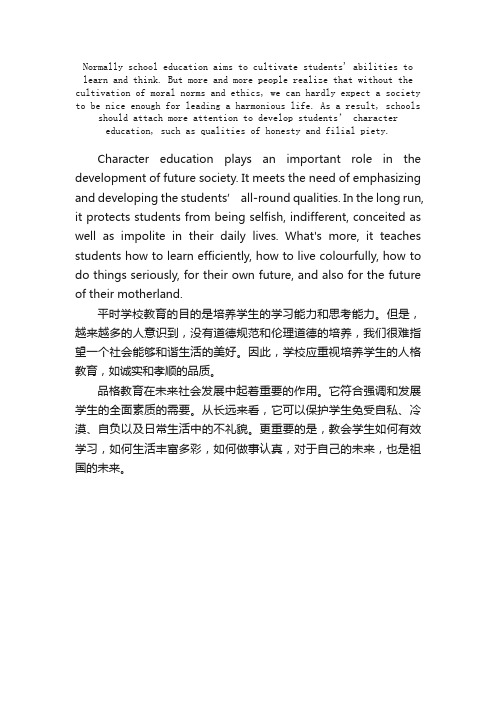
Normally school education aims to cultivate students' abilities to learn and think. But more and more people realize that without the cultivation of moral norms and ethics, we can hardly expect a society to be nice enough for leading a harmonious life. As a result, schools should attach more attention to develop students’ charactereducation, such as qualities of honesty and filial piety.Character education plays an important role in the development of future society. It meets the need of emphasizing and d eveloping the students’ all-round qualities. In the long run, it protects students from being selfish, indifferent, conceited as well as impolite in their daily lives. What's more, it teaches students how to learn efficiently, how to live colourfully, how to do things seriously, for their own future, and also for the future of their motherland.平时学校教育的目的是培养学生的学习能力和思考能力。
moralityandeducation(道德与教育)_300字【优秀作文】

moralityandeducation(道德与教育)_300字【优异作文】Morality and Education( 道德与教育 )_300 字Morality and Education It is recognized by everybody that the strength of a country depends upon its education.The higher the education standards the stronger the country becomes. That is true indeed. But my opinion is that in order to make a country strong education alone is not sufficient. It should go side by side with morality. Morality and education are the foundation of a country. The absence of either makes success impossible. Education without morality is dangerous.Morality without education is also harmful. ( 85 words)道德与教育每一个人都认识到国力的强盛依赖教育。
教育水平越高,国家就越富强,这是确切不移的。
但我的看法是,为了国家的富强,独自的教育是不够的,教育与道德应左右开弓,不可以偏颇。
道德与教育是国家的基石,缺乏任何一个,成功都是不可能的。
没有道德的教育是危险的,而没有教育的道德是有害的。
五育并举英语作文

五育并举英语作文As we all know, modern education should aim to develop students in all aspects - academics, sports, arts, morality, and labor. This well-rounded approach is known as "五育并举" in Chinese, which means the simultaneous cultivation of the five areas of development.正如我们都知道的那样,现代教育应该旨在全方位培养学生 - 学术、体育、艺术、道德和劳动。
这种全面的教育方法被称为"五育并举",意思是同时培养五个发展方面。
Academically, students should be provided with a solid foundation in subjects like mathematics, science, language arts, and social studies. These subjects are essential for students to develop critical thinking skills, problem-solving abilities, and a strong knowledge base.在学术上,学生应该在数学、科学、语言艺术和社会学等学科中获得坚实的基础。
这些学科对学生发展批判性思维能力、解决问题能力和强大的知识储备至关重要。
In terms of sports, physical education is crucial for students to maintain a healthy lifestyle and develop teamwork skills. Engaging inphysical activities helps students improve their physical fitness, coordination, and overall well-being.在体育方面,体育教育对学生保持健康生活方式和培养团队合作精神至关重要。
- 1、下载文档前请自行甄别文档内容的完整性,平台不提供额外的编辑、内容补充、找答案等附加服务。
- 2、"仅部分预览"的文档,不可在线预览部分如存在完整性等问题,可反馈申请退款(可完整预览的文档不适用该条件!)。
- 3、如文档侵犯您的权益,请联系客服反馈,我们会尽快为您处理(人工客服工作时间:9:00-18:30)。
Education and morality 教育与道德-英语作文
Normally school education aims to cultivate students' abilities to learn and think. But more and more people
realize that without the cultivation of moral norms and ethics, we can hardly expect a society to be nice enough for leading a harmonious life. As a result, schools should attach more attention to develop students’ character education,
such as qualities of honesty and filial piety.
Character education plays an important role in the development of future society. It meets the need of emphasizing a nd developing the students’ all-round qualities. In the long run, it protects students from being selfish, indifferent, conceited as well as impolite in their daily lives. What's more, it teaches students how to learn efficiently, how to live colourfully, how to do things seriously, for their own future, and also for the future of their motherland.
平时学校教育的目的是培养学生的学习水平和思考水平。
但是,
越来越多的人意识到,没有道德规范和伦理道德的培养,我们很难指
望一个社会能够和谐生活的美好。
所以,学校应重视培养学生的人格
教育,如诚实和孝顺的品质。
品格教育在未来社会发展中起着重要的作用。
它符合强调和发展
学生的全面素质的需要。
从长远来看,它能够保护学生免受自私、冷漠、自负以及日常生活中的不礼貌。
更重要的是,教会学生如何有效
学习,如何生活丰富多彩,如何做事认真,对于自己的未来,也是祖
国的未来。
